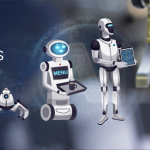
Artificial Intelligence (AI) is fast making a foray into our personal lives. Take for instance the portrait mode effect while we capture images through smartphones, the social media feeds in our timeline, (it is all curated by AI) when we use Google Maps for navigating or call an Uber. In the case of Uber rides, it is AI that decides the price and car that match our request. Without a doubt, AI is the most transformative technology today.
Enterprises and AI
As any new technology is meant to improve productivity, businesses especially cannot afford to overlook the potential of AI. Gartner predicts that AI will rank among the top five investments for more than 30% of CIOs by 2020. Going by the McKinsey Global Institute Insight, by 2030, 70% of companies would have adopted at least one type of AI technology. To realize the true potential of AI business will need to take several actions sooner rather than later. By leveraging the first-mover advantage they can take productivity and efficiency to new heights and outpace their rivals.
In the real scenario, while developments in AI are business-ready there is a strong disconnect between the enthusiasm around AI and its actual deployment in applications. The majority of the AI projects lie in the pilot stage. To catapult to the launch phase companies should look at initiating an assessment of their AI-readiness and identify quick-win opportunities which lead to prompt financial benefits, justifying the deployment costs of AI.
The proliferation of AI across sectors
To succeed in AI efforts businesses need to unify their AI efforts with the greater business transformation efforts. In the insurance sector, a major health insurance provider is already using AI methods to customize benefit design which has led to a 180% growth in their new member acquisition rate. What lies ahead in aviation? AI-based virtual assistants are helping pilots to increase their efficiency and productivity. A major American airline is using Amazon Alexa to answer common passenger questions. By using AI in predictive maintenance analytics aviation players are trying to predict how and by when aircraft maintenance schedules ought to be completed.
The healthcare and life sciences sector is also not behind when it comes to the adoption of AI. Healthcare is one sector that is ripe for disruption through AI. Very soon healthcare players will use the power of a popular AI-platform to empower clinicians helping them decide on the most appropriate therapy and also provide decision support with evidence-based data sets. Interestingly, AI is all set to become the cornerstone of precision diagnosis. Without replacing doctors, it will only complement them, ensuring they stay on the top of their game.
Returns from deploying AI
Deploying AI technologies alone is not sufficient, it is equally critical that organizations demand ROI. AI unlocks new revenue streams increasing the top-line figures, it also brings about efficiencies in operations improving the bottom-line. We can use AI to cut down on repetitive tasks, develop new products and bypass the invention process ourselves. AI intervention will only improve customer experience initiatives and marketing and sales functions leading to top-line growth.
While AI has the potential to boost profitability by an average of 38% by 2035 across 16 industries, it has its limitations. Despite the strong potential, AI systems need to be continually trained and recalibrated. We have reached a stage that AI will not be restricted to performing tasks. Instead, we need to raise it to act as a responsible member of society. According to experts in the next few years, AI will work along with humans in collaboration as their co-workers. We can no longer treat AI as a mere software but rather embrace the concept of citizen AI.
Need for responsible AI
With great power comes responsibility, and so is the case with AI. Most of the fears and concerns related to AI revolve around loss of privacy, significant biases in decision-making, and gradually losing control over automated systems. Responsible AI ensures transparent, ethical, and accountable usage of AI and guards critical decisions against biased algorithms. The need of the hour is transparent AI which allows one to check whether AI models are well-tested. In organizations, one could ascertain whether the AI models are aligned to the core principles for larger business goals.
While AI proliferates across most sectors, the skepticism around it will decrease with the right approach and timely decision-making.
About TCG Digital
TCG Digital accelerates enterprise digital transformation with hyper-contemporary technologies, advanced analytics, data strategy, application development, mobility, RPA, cybersecurity, and IoT to deliver Velocity to Value .
We are the flagship technology consulting and solutions company of “The Chatterjee Group”, a multi-billion dollar portfolio of corporations. This affiliation empowers us with access to global talent, subject matter expertise, and a ‘1,000 digital minds’.
Our clients range from major global brands and large government entities, to small and mid-market companies; with a recognizable roster of enterprise logos. We differentiate through deep systems and sectoral knowledge, acute agility, impeccable quality, and ready ease-of-doing business.
Our mantra is simple: Velocity to Value – transformation acceleration for the digital enterprise to deliver rapid, measurable ROI through relentless innovation. Whether you are setting strategy, ready for implementation, or encountering technical drag, TCG Digital brings to bear talent, solutions, and highly performant platforms to catapult your business to successful, sustainable disruptions.













